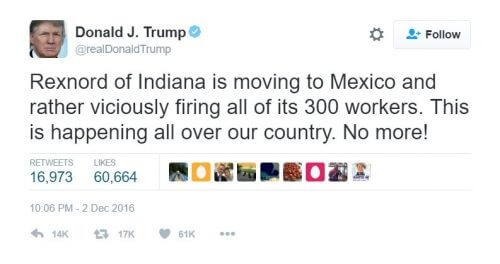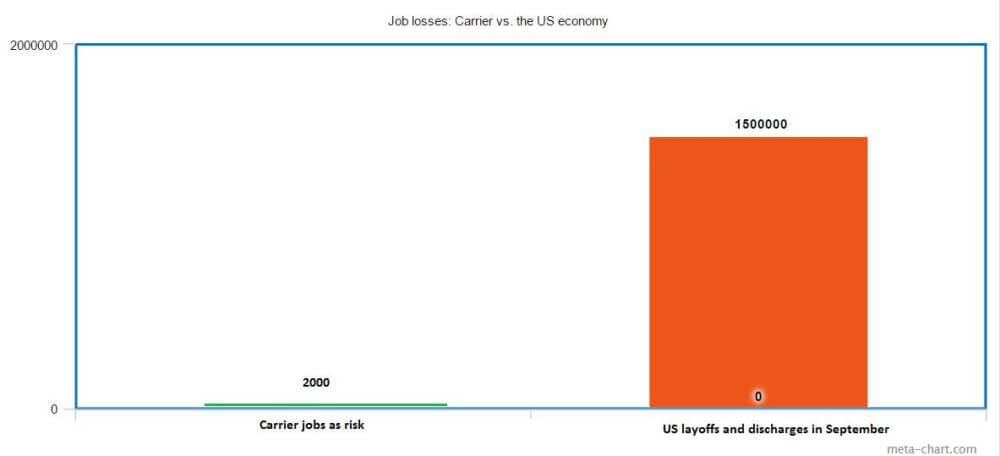Ricochet is the best place on the internet to discuss the issues of the day, either through commenting on posts or writing your own for our active and dynamic community in a fully moderated environment. In addition, the Ricochet Audio Network offers over 50 original podcasts with new episodes released every day.
 Saving One Factory Job at a Time Is a Non-Policy Pretending to Be an Actual Policy
Saving One Factory Job at a Time Is a Non-Policy Pretending to Be an Actual Policy
So Donald Trump is taking credit for saving nearly half of the 2,000 Carrier manufacturing jobs that were headed to Mexico. The manner in which this happened troubles me greatly. And now he has his sights set on another Indiana manufacturer:

I think it is also important to put this all in context with the massive monthly job churn in the US economy. From the Bureau of Labor Statistics:
Large numbers of hires and separations occur every month throughout the business cycle. Net employment change results from the relationship between hires and separations. … There were 1.5 million layoffs and discharges in September, a decrease of 218,000 from August.
And some further context:

I actually had to really juice up the green Carrier bar because, compared to the monthly job churn number, it really didn’t register visually. It was imperceptible. One might have also compared the 800 jobs saved to the 178,000 net new jobs created in November, or 223 Carrier Units.
Of course those Carrier jobs are pretty darn important to the workers themselves. Obviously. But rather than ad hoc presidential interventions, I would much rather create a better domestic growth environment, while making sure workers can ably transition to new jobs, even in other regions. That would seem the better long-run path both for US workers and their children who will some day be entering the labor force. As I wrote last week:
Published in Culture, EconomicsWorkers have a responsibility to make sure they are preparing themselves to prosper in a modern, technological advanced, dynamic economy with no promise of lifetime employment at one firm. After all, Trump, in his Carrier speech, said he wouldn’t penalize firms for moving factories within the US. The goal should be an economy of maximum competitive intensity with workers helped by a modernized safety net.




CEO of United Technologies now says many of those jobs in Indiana will be lost to automation:
http://www.nytimes.com/2016/12/06/us/politics/donald-trump-transition.html?smprod=nytcore-iphone&smid=nytcore-iphone-share&_r=0
That $16 million investment you thought was so great will put those people out of work anyway. Why? Because manufacturing that product at US labor prices is impossible. You folks were hoodwinked by a master huckster.
I have a fantasy that all punditry be offshored and only essays in Mandarin be published. Then JP would have to ditch all his training in English and take night courses, while he toils by day as a barista. That wouldn’t be fair, but it would be roughly equivalent.
Automation in manufacturing has been going on for two centuries, and is a primary factor in higher standards of living.
If a task that could be done by 2000 people in Mexico is done by 500 people in the US, as a result of being done in a more mechanized way…that’s still 500 more jobs in the US than the alternative, and also less downward pressure on US wages.
If the primary goal is to save US Jobs why don’t we stop automation? It seems to me that factories have gotten advanced enough.
He’s President elect not president, Pence is still governor, states’ do this all the time, it’s PR for Trump, not economic policy. The thing that’s bothersome at this time is cheering the move as economic policy. If such an approach became policy it would be a disastrous corrupt failure. Let’s remember, take him seriously but not literally, but don’t cheer what otherwise would be really bad policy.
Why stop at factories? Technology has cost us a lot of jobs in vertical transportation as well:
The elevator safety and economic opportunity act
I think we should just start a ditch digging industry armed with spoons.
And that is exactly how it was used when he persuaded Carrier to keep those 1100 jobs in the country. It was good PR for all, and, not incidentally, made for a very good Christmas for the Carrier employees who are keeping their jobs.
Thought question: If Henry Ford had been able to have the Model T manufactured in Mexico by people making 50 cents a day…and with no need for the assembly line and related productivity-improving technology…would that have been equivalent, in terms of its economic, social, and political consequences, to making it in Detroit on the assembly line with workers making $5.00/day and a 10:1 reduction in unit labor content?
Keynes is pleased.
Enormous difference, literally all the difference in the world. The world is arranged by God into sovereign countries. Those countries have borders, and full sovereignty to control flow of goods across their borders. If a country is losing jobs to another country, it can easily implement border control policies to reverse it.
But what sovereignty does a country have to limit the minds of its people to stop them from inventing and implementing new technologies that require less manual labor? What a horrible country that would be! Why would a country ever want to govern itself back into the dark ages? Innovation should be championed and encouraged, not stifled and berated.
As I said elsewhere, innovation opens up new horizons which we were not able to see before. When there is no longer a need for cashiers, a new frontier for low-cost labor will open up, one that requires more of a human touch.
I struggle to grapple with the data point of 95 million citizens out of the workforce and millions more under employed in part time jobs and then listening to our learned brethren dropping link after link to assuage their feeling that it is all Just Too Bad.
We have been running to their prescription in trade for decades now.
It may be time to rethink some shibboleths.
I am all in favor of Trump using tax and regulatory policy to create a domestic climate for business that entices companies already here to stay and those thinking about coming to invest here. Foreign direct investment makes us richer.
But I am opposed to any president threatening individual companies with retaliation for making what they consider to be the best business decision for the firm. Not only is that poor economics, it is tyrannical and probably unconstitutional. Maybe it’s good politics, but if that’s all this so called revolution is about, it isn’t worth much.
Carrier was the first use of such threats. It appears that it might not be the last.
I have a feeling that the plan will be global, not individual.